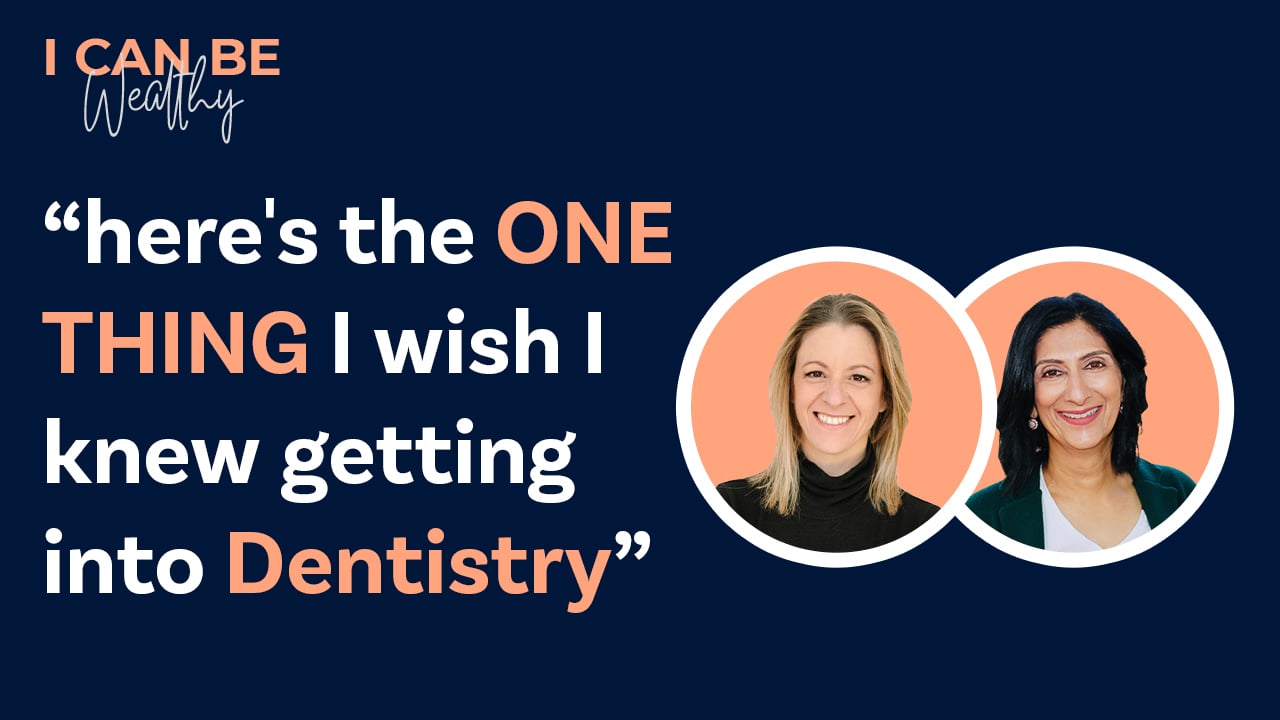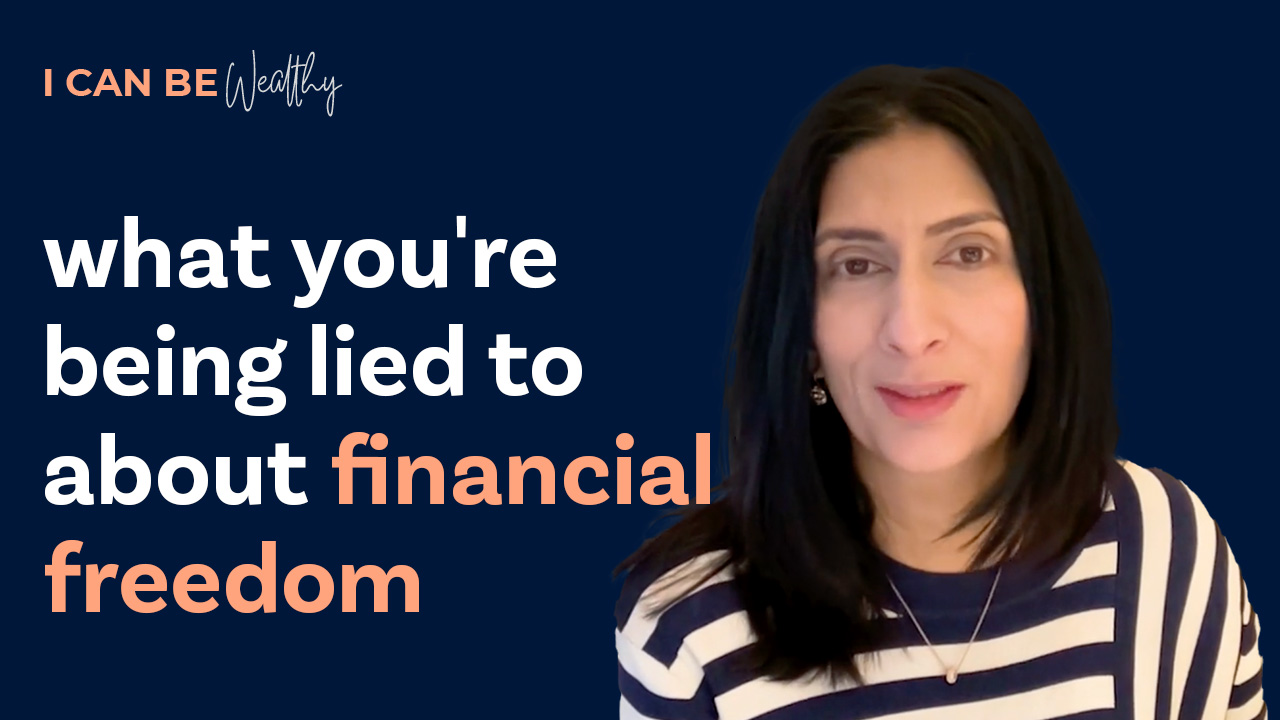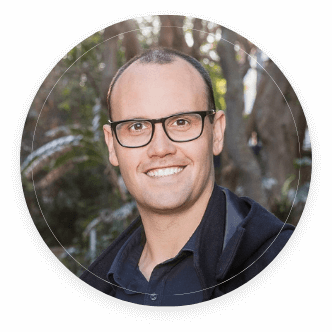Wealth Building is About Building a Safety Net For Yourself
Now, there are a lot of business owners out there who really struggle with the idea of wealth building. Their highest return on investment and time is in the business. So the attitude becomes, “Why invest time and energy elsewhere?”
On top of that, the world is full of noise, it’s full of charlatans, it’s full of people who’ve really done the wrong thing: there are a few bad apples, and they’ve spoiled it for a lot of people.
Many of us can’t be bothered figuring it out, so we do what is safe, like engaging a financial planner or a buyer’s agent. And in doing what’s safe, you end up with fairly modest returns. This compounds your view that investing is just a crap return. You know your business inside and out, so it seems like a safer bet than trying to build wealth elsewhere.
So the focus is entirely on building a business asset that has value. And your fear deep down is you actually don’t know how much is enough. So what a lot of wealth professionals and exit advisory people will say to you is, “What’s your number?” And you know, frankly, the number in itself isn’t necessarily going to give you a whole lot of comfort if you don’t actually know what to do with it when you have it, other than obviously spending it.
But here’s the thing: if you can open your mind to a different way of thinking, then what you’ll realise is that the exercise of wealth building is really about trying to create a safety net for yourself. If you get it right, it takes virtually no time or energy but just builds and compounds exponentially. Quite right, it may not ever give you the same rate of return that you get in your business, but I’ll unpack for you in a little while why that might not be such a bad thing.
Focus on getting really good at one thing. If you just get good at building your board of advisors that you know, like, and trust, then what they’re going to do is actually plug the relevant holes for you in your knowledge and wisdom to give you that high degree of control. That allows you to stay focused on building your business, and then the building of the wealth just happens automatically in your wake.
That leaves you with a situation where you’ve got clear goalposts, and you know exactly what you’re reaching for, you know exactly how much is enough, and how you’re going to get there. That’s the aspiration.
A Higher Net Worth Doesn’t Equal to Zero Financial Problems
I’ve spoken to so many business owners over the last 5-7 years who are in a lot of financial pain, and I’ve said this before: there’s an assumption that as your wealth and net worth grow, the financial problems disappear. But a little bit like rearing children, they don’t disappear, they just change form.
What people have described to me and what I’ve witnessed is that there is a huge concentration risk in making your business your sole vehicle for wealth building. And let me just clarify, what I mean is that we all understand the concept of diversification, we all understand that we should spread our money into a number of assets in order to give ourselves a higher chance of surviving in the unlikely event of world disasters, economic turbulence, and so forth.
But for some reason, people intellectually understand that they have a real blind spot when it comes to their business. And it comes back to what I said earlier, that a lot of business owners will argue, “Why would I invest in something that gives me half the return when I can get a high double-digit return on my time and investment inside my business?”
But ultimately, and I’m going to share a couple of case studies with you today, building wealth outside your business is the ultimate insurance. It’s the ultimate plan B.
I often ask business owners, if something were to happen to you tomorrow and you could no longer run your business, would your family, partner, wife or husband know what to do? And a lot of business owners scratch their head and realise that, actually, either their partner or their kids have no interest in the business, or they don’t have the skillset, or maybe there’s just no obvious succession plan.
And this isn’t about succession planning, the reason that a lot of business owners have approached me over the last couple of years is to help them on that wealth-building piece. It’s not so much they don’t have amazing businesses – in fact, I would almost say some of these guys have cash cows, these businesses are super lucrative and super valuable.
The challenge they face and the concerns they have are that if something happens to them or something happens to the business, they don’t want their families to suffer. And this comes back to the idea that a lot of entrepreneurs and business owners are providers, sometimes the sole providers, in their tribe or in their family.
So, building wealth is really not so much about saying, “Look, how can I build another income stream for myself that will at least equal my business?” It’s not about that, it’s about creating an insurance policy and a safety net.
The Two Business Exit Strategies You Can Fall Under
One of the things that I know for sure is the two ways of exiting:
- The business owner who recognises almost from the get-go that there is a need to build wealth in the background and create that insurance policy. And maybe there are other motivators around why they build wealth, maybe it’s about experiences they had in their childhood or lessons they’ve learned from their parents, or just sheer drive and ambition.
- But then on the other side, you’ve got business owners who are extremely talented in their methods for developing wealth – and yet, they’re naive to believe, and I say this in a compassionate way not in a negative way, that they’ll just get a big-ticket sale one day from that particular asset that will solve all their financial problems. So, the necessity to build other wealth is just wiped clean and not necessary at all.
These are the two extreme ends of the spectrum, and then you’ve got everything in between.
But the question I’m asking you to consider today is: which one are you, or which end of the spectrum do you sit at?
I want to encourage you to shift your thinking to when your business grows, and your dividends start to swell. Instead of sinking all of that into your lifestyle, get the balance right.
I understand that you work your butt off, and you need to enjoy and reward yourself for that. I mean, part of the reason you go into business is you want to take the limits off finances and the way that you impact your world. So I get that there’s a need to reward yourself.
But I think a balance can be struck between growing your wealth and just blowing it all on lifestyle. And sadly, too often, I see business owners justify the need to satiate their wildest, most extravagant dreams at the expense of wealth building.
Frankly, I don’t think they need to be mutually exclusive. I guess what I believe is, satiating your wildest, most luxurious dreams shouldn’t happen at the expense of wealth building.
The Three Things Business Owners Aspire to
There are plenty of other podcasts I’ve created around the topic of “How much wealth is enough?” And for those of you who are interested in that, I encourage you to go back and listen to some of the ones where I talk about freedom formulas particularly, there’s a podcast ideal around the three parts to the wealth game.
As a recap, when I ask business owners what it is that they want, like if we think about the business asset as one asset, and then all the other wealth that you build as your overall wealth, what is it that you are trying to achieve?
Everyone, to some degree, will give me varying emphases on three things:
- They want liquidity. They want the capacity to generate an income stream that not only delivers them enough income to maintain the life they want but also creates a surplus, so more income than they need to live off.
- The second thing is, they want leverage. They want to take whatever finite resources they have and massively amplify them.
- And then the third piece is legacy. They love the idea that their wealth can be used to influence, and that is really the true meaning of the word legacy. What causes and charities do you care about? How do you want to financially support and facilitate the dreams and aspirations of your children and people in your greater family? And how do you want that to manifest in terms of, like, earning $1 today and having it still be in existence in 100 years time?
So those three pieces are generally what people aspire to. What sits in the middle of all of that is this definition of financial freedom: the ability to wake up in the morning and just go, “How do I want to spend my day?” And for some of you, this is not about retirement. I say this all the time, retirement is a bit of a dirty word for business owners, but it’s about that choice.
And what I know for sure is, when you create a portfolio of investments that generate more income than you need to maintain your lifestyle, that is life-changing wealth, and that is the ultimate goal of building wealth. When you have that phenomenal situation, it puts you in a place where you can make better choices around what you do with your business.
So if I come back to those two ends of the spectrum, let’s imagine a business owner who has done as much as they can with their wealth-building outside their business. By the time they are ready to step out of the business, the fact that they can or can’t sell their business becomes irrelevant to some degree, because they have already established enough assets outside the business.
And at the other end of the spectrum is the business owner who’s put it all on red, who wants their business to really be the asset that they take to the market and sell for a super high ticket.
Now, of course, with any kind of investing, there’s never any right or wrong, but I hope some of the points that I’ve discussed today help you understand the risk that is connected with the putting it all on red strategy, which is to sell the business.
Salena’s Real Life Case Studies
So what I want to do is take you through a couple of case studies of real clients that I’ve worked with.
The first one is a very talented entrepreneur who has run a number of businesses over the last 30-35 years and has become so good at what he does that there’s almost this sense of invincibility. It’s almost like he can start a business overnight and have it ramp up to seven figures within a very short space of time.
This guy’s number one wealth plan was to build this company and create an asset that was worth tens of millions and then sell it off. He’d been banking on this for a long time, and because of that, he had done zero investing outside of the business and found himself in a situation where he lost everything, not once but a couple of times over.
He had to really work his butt off to recover and restart a new business, but only probably about two years ago, found himself in a situation where he thought, “I really need to get my act together and start building a bit more of a safety net.” As a partner of someone who’s highly creative and highly talented, I think that from a financial perspective, his wife experienced a hell of a roller coaster ride.
And so this guy realised, unfortunately, a little later in life, that idea of just banking on a high ticket sale is maybe a good one if you’re young, and you can cash out, and then you just sit.
But if you’re later in your journey, if you’re in and around the age of 50, and you’re still in that position where you’re banking on your business saving you, then I think potentially you should start looking at what you could do to make up for some lost time.
The other case study that I want to talk to you about is a younger guy who has come from a difficult background in that, for whatever reason, he made the decision to stand on his own two feet from a very young age.
He started his business by himself and has worked his butt off to create unquestionably one of the most successful businesses in his industry. I’ve had the privilege of working with a number of people in this particular industry, and I’ll be frank, it’s a medical-based industry, and this guy would be in the top 5% of earners and success stories in that industry.
But he had recognised the need to build wealth outside the business very early on and proceeded to invest in a series of residential and commercial properties. And when I first met him, he had arguably one of the biggest portfolios for someone of his age. And unfortunately, he was also in a situation where the cash flow from that portfolio was pretty disastrous. But nonetheless, he had a capital base which was enviable by any standards.
And so the work that we did together was to look at each asset: was it working? Was it actually in great condition? Was it serving its purpose? And then making some tweaks to the portfolio. So it went from being highly negatively cash flowing to massively positively cash flowing.
And then, the capital that he’d freed up he could he deploy into some alternative investments and really five-times his income within a very short space of time. So that’s really been the plan that’s been executed.
Final Thoughts
I guess the moral of the story, and really where I want to leave this today, is that there’s no question that there are some talented business owners out there who will undoubtedly sell their business for a high ticket sale at some point in the future. And there are some great people out there who can support you and assist you with that if that’s the pathway that you’re on.
If anything that I’ve said today resonates with you, if you like the idea of really getting serious about building that plan B, that insurance policy, then there’s never been a better time to think about that than now.
The market, especially around real estate, has become incredibly frothy; yields and income streams have become very compressed. It is now the play of the smart investor who’s prepared to think outside the square that can get the biggest gains in the next two, three, four years.
Think about it if you are squarely sitting in either of those two boats, or you’re somewhere in between, and you want some help. Just reach out – you can always get me on email: salena@freedomwarrior.com.au.
Otherwise, I love to get your feedback and love to get some ideas and thoughts from you about podcasts and topics that you’d like to hear about in the future.
And thank you to all those people who have given me lots of words of support in recent times. I really appreciate it.
If you’re a business owner feeling frustrated that despite doing everything right in the property investing playbook and you’re no closer to financial freedom, then head over to www.freedomwarrior.com.au to learn more about how you can use alternative investments to catapult your investing income and blend strategies to shave decades off your timeline to financial freedom.
If you’re interested in understanding how to create wealth through alternative strategies, please check out my programs, where I help you catapult your investment income and blend strategies to shave decades off your timeline to financial freedom.
Or, you’re welcome to get in touch today, book a call with me, and I would be happy to talk you through it – no obligation!









